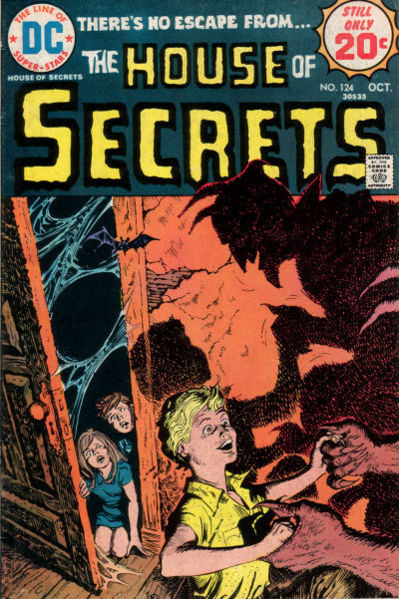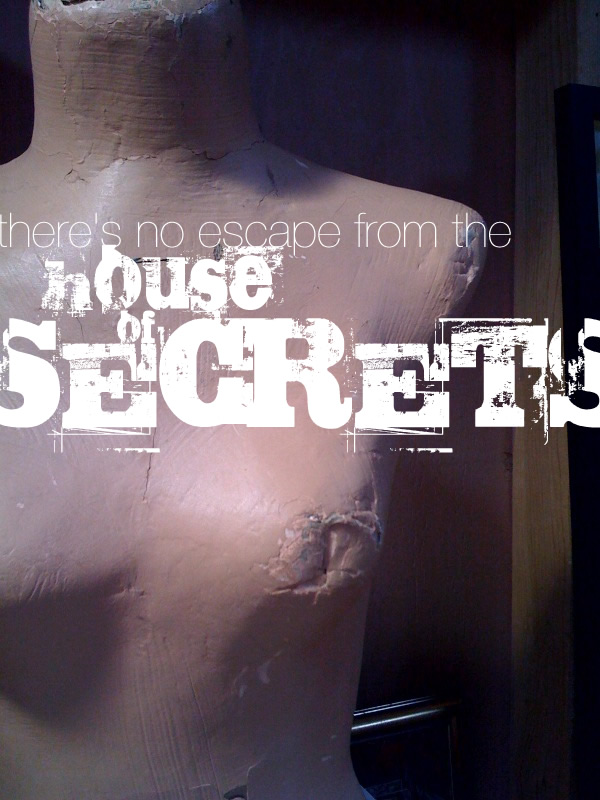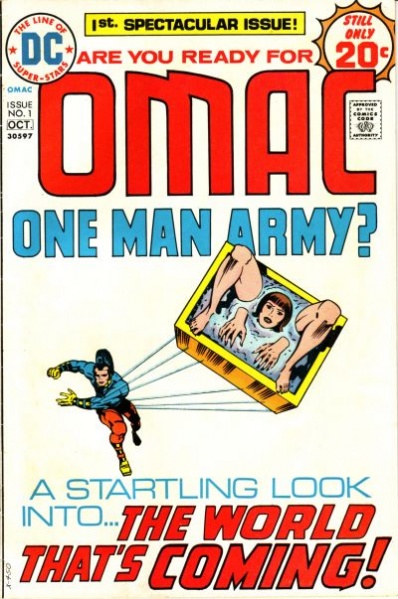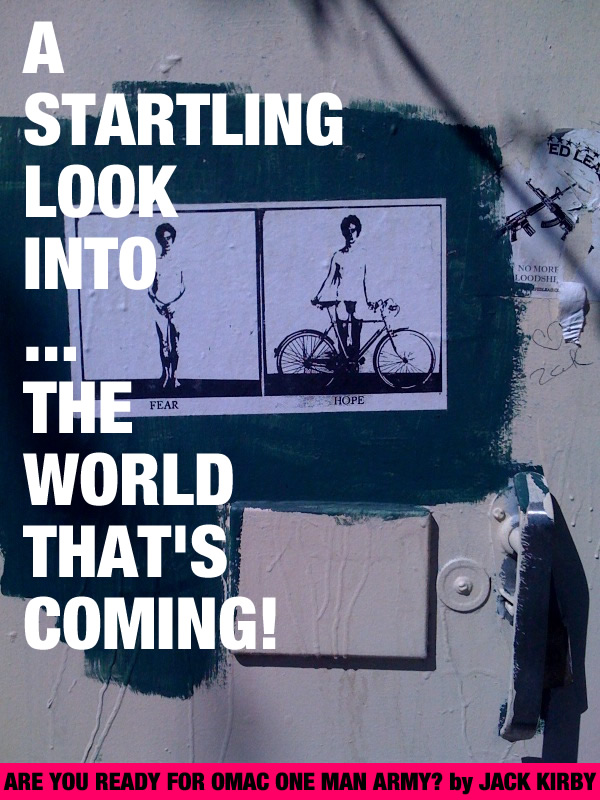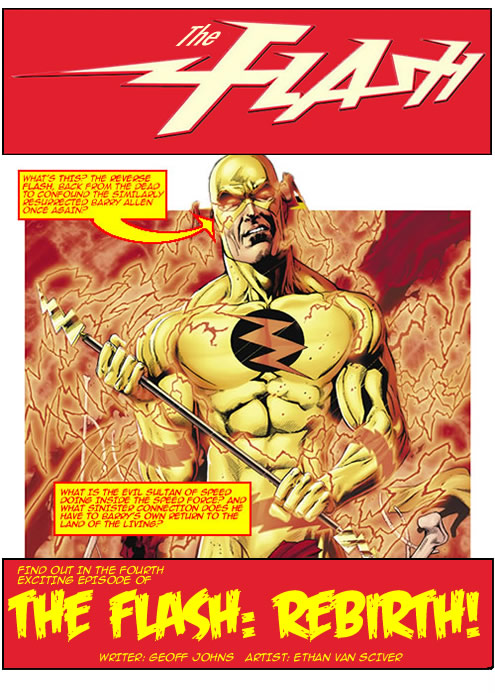Visual Stylings
A variation on Stuart Immonen’s Marvel 70th Anniversary Covers meme, only this time with two DC Comics dated October 1974 – the month of my birth – and using photos I happened to have on my iPhone.
Original:
Original (and, by the way, holy shit that this came out dated October 1974):
I still love that cover line for OMAC.
Let’s Look At The Cartoonometer!
I am kind of weird fascinated by this 1991, pre-launch presentation for the Cartoon Network, and the mix between aw-shucks, “Everyone loves cartoons!” pitch and business talk:
I don’t watch that much Cartoon Network – or Boomerang, which is basically what this pitch turned into – aside from Venture Bros, Batman: The Brave and The Bold and Star Wars: The Clone Wars (and my work accounts for one of those), but part of that is because the cartoons on there (and Boomerang) don’t really appeal to my sense of nostalgia. If someone created a channel that showed old Transformers, Centurions and things like that (plus things like GI Joe, which I never saw but have nostalgia for because of the comics), I’d be there in a shot. I can imagine the stress TiVo would have already.
When Technology Fails
I think my iPhone hates me. It’s developed this new trick, recently, of telling me it has reception, but refusing to dial out or receive calls; I have to restart it to get it to work. Similarly, the phone won’t ring, and then all of a sudden, there’s a missed call and a voicemail from out of nowhere. I’m telling you: either my iPhone hates me, or else it’s broken, and that’s something that I’m not willing to consider a possibility just yet.
Of course, just saying that means that it’s probably broken. I shouldn’t be surprised, it’s probably made with some kind of short shelf-life to make sure that I upgrade the software and the hardware as often as possible (In fact, come to think of it, the problems started as soon as I started ignoring iTunes’ subtle reminders that there was a new OS upgrade available that I could download and install. Is it possible that the phone somehow knows?). I remember being told by some BestBuy or some similar store that I can’t remember the name of, in a very suspicious “I shouldn’t tell you this, but…” way, that all computer equipment is built to essentially self-destruct after a set period of time (3 years, according to him) to ensure that you have to buy new stuff. This may have been his way of apologizing for the price of the new printer he was selling me, but still; the point was made.
I like to think, mind you, that things like iPhones, with their high price tags and their ridiculous monthly charges, would be built to last, and that Apple – personified by that nice Justin Long in the television commercials – wouldn’t have created an inbuilt death just to make sure I’d buy another one sooner rather than later… and then I see things like this.
Time to start saving up for a new phone, perhaps.
Self Vs. Self
Am I the only person who has days when their brain says one thing and their body does another? For example, my brain just said “I should check work email” and yet, somehow my fingers typed out the URL for Facebook, despite the fact that I never, ever, ever check Facebook*, so I don’t even have the “it’s a learned response” excuse to hang on.
(* This is only a mild exaggeration; the only times that I find myself on Facebook is when I either am very, very bored and the internet has run out of ways to entertain me – which, considering the size of the internet, should tell you something – or when I see one of those “BlahBlah has sent you a message on Facebook!” alert emails and the first line of the message is something like “OH MY GOD I AM DYING.” Otherwise, I always read the alert email and think, eh, I’ll respond to that later and never ever get around to it. If pressed, I have to admit that my feelings about Facebook are not a million miles away from this.)
(I love The IT Crowd, and love Netflix Instant Streaming even more for giving it to me, considering American television didn’t want to. Yes, even BBC America.)
But there are times when my body has decided that it’s sick of being ruled by my head. When my head is saying things like “Well, that’s ridiculous to have a second quesadilla, that first one was pretty big,” for example, or anytime when I start to watch Dollhouse and tell myself not to fastforward through the dull bits (AKA, most of Eliza Dushku’s scenes). I comfort myself, when these things happen, by telling myself that it’s the onset of advanced age, and that my body has learned that it occasionally knows better than my brain – something almost scientifically demonstratible in the case of Dollhouse and fast-forwarding, I feel – but nonetheless, it nags at me. One day, I’m convinced, I’ll wake up and my body will decide that it’s clearly time for me to stay in bed even though I have countless things to do that’re more productive. Instead, I’ll stay under the warm covers, comfortable and snug ignoring the world and its worries.
There are worse ways to go, I think.
Another Reason Why It’s A Good Thing I Am Not A DC Comics Editor
Because, if I was, the first page of The Flash: Rebirth #4 would’ve looked something like this.
Ten Days
(If it’s a weekend where I’m doing io9 – including the 5 US Presidents Who Could Save Us From An Alien Invasion, thankyouverymuch – as well as the Comix Experience newsletter, then it’s a weekend where I’m far too slammed to come up with blog content. Which’ll explain why there was nothing yesterday (Sorry, all), but! Here’s last month’s now-no-longer-even-vaguely-relevant essay from the CE newsletter to give you something to read today.)
They’ve become known as the ten days that rocked the comic landscape! Ten days during August and September 2009 when the American comic industry as we knew it was irrevocably altered, thanks to two business decisions made by men, women and cartoon rodents who wouldn’t be able to tell the difference between Johnny Storm and the original Golden Age Human Torch even as they eagerly and avariciously listed them as two entirely distinct intellectual properties to shareholders (Clue: Only one of them would call Crystal of the Inhumans his girl, in the “Hey, buddy! Watch what you’re doing around my girl!” sense. And that’s because only one of them actually has working genitalia, because only one of them is not a stinking robot). As the comic industry reels from the realization that Hollywood didn’t really like it at all, it was just pretending to so that the comic industry would loosen up and give up all its ideas for potential hit movies, we take this opportunity to look at Marvel’s purchase by Disney and Warner Bros’ creation of DC Entertainment and explain for you all: What does it all mean?
How Mickey Mouse Took Paul Levitz’s Job But At Least He’ll Be Writing The Legion Again, So That’s Something, Right?: A Fanboy Rampage Special Report
Part 1: The Mickey Mouse Club.
August 31st, 2009: A day that will live in infamy for many, even though I just had to Google the date and was surprised that it wasn’t later. That was the day that millions of people woke up to the news that the Walt Disney Corporation was planning to purchase Marvel Entertainment in a stock and cash transaction worth 4 billion dollars, and at least half of them didn’t, as I did, assume it was some kind of elaborate scheme and then go back to sleep.
Within hours of the early-morning announcement of the buyout, Disney and Marvel held a conference call for investors, during which everyone sounded remarkably awake and happy about the deal, telling everyone that Marvel would stay exactly as it was, just like Pixar had (apart from that whole “Pixar being forced to make Toy Story 3 to keep Disney’s licensing division happy, even though no-one at the studio wanted to” thing), that Disney management understood that Marvel was already a corporate juggernaut dedicated to eradicating all of its competition by releasing so much product that other publishers would be forced off the shelves and raising prices because they were confident that fans would buy Avengers books at $3.99 even if it meant they’d have to drop a Dark Horse title or two to keep up, especially when they release continuity-important one-shots on a regular basis in addition to the monthly titles, and that, no, Mickey Mouse wasn’t really on the call, that’s just what Marvel Editor in Chief Joe Quesada sounds like when he’s excited. But for fans who weren’t invited to the call, all that existed were questions. Questions like:
• Does this mean that notoriously family-friendly Disney is going to stop rapist and murderer Norman Osborn from running the Marvel Universe, as depicted in the very realistic and not overlong or adolescent at all Dark Reign storyline?
• Does this mean that notoriously family-friendly Disney is going to stop books like X-Force (wherein superheroes are presented as black-costumed, red-eyed murderers), Thunderbolts (wherein supervillains are presented as pretend-superhero murderers) and Dark Avengers (wherein supervillains are presented as pretend-superhero murderers but it’s different characters so it’s not the same book at all, okay? Jeez, you’re all so picky with your “Oh, look at me, it’s the same idea as this other book, Marvel are milking this admittedly-thin idea for all it’s worth in an ill-timed cynical move that reflects the just-completed Bush era much more than the more optimistic, reflective Obama era in a curious misstep for the normally more-zeitgeist aware publisher!” Like Thor and Captain America don’t both fight crime!) from being published?
• No, seriously, Marvel’s still going to be all bad-ass and crap, right? I mean, they are, right? Come on, you can tell me. Seriously, come on, man.
• Is the Thing related to Mickey Mouse now? I mean, they both have three fingers, don’t they?
No answers, however, were forthcoming. Requests made to Marvel’s publicity department went unanswered, and even the normally fact-filled (Did you know that Marvel editor Tom Brevoort is grouchy?!?) Twitter feed of Joe Quesada offered nothing but mocking commentary hinting at the underlying fear and self-hatred of a man being slowly crushed by the gears of corporate entertainment machinery built around his ample frame. Documentation stolen from the Marvel offices at this time, however, revealed that the Disney buyout was actually orchestrated by Marvel executives who not only had no idea about how to follow the success of Iron Man and Secret Invasion. One email we recovered from the kerosened shell of a Dell computer read “Please, please. We are convinced we’re going to mess it up. You guys have been doing this for years, and if you buy us then everyone will blame you not us. How many characters do you want us to have? 2000? 5000? We’ll come up with a list. Will that make it easier? Oh God, save us please.”
Little did everyone realize that, across the crud-filled streets of Manhattan, Marvel’s main competitors were about to show everyone what a small world it really is, after all.
Part 2: That’s Entertainment.
With the comic industry still reeling from the idea that famously portrayed underdog Marvel Entertainment – what with their position as comic industry leader left almost untouched in more than a decade, their incredibly successful movie studio and licensing deals that would keep them solvent for many years to come even if everything else tanked – was now part of the Corporate Monolith of the entertainment industry, and the repercussions that came from that news – What if Disney started looking at the the possibility that the market couldn’t really support five monthly Avengers titles longterm? How can Marvel employees continue to claim that DC can afford to fund new formats and new ideas because of their corporate backing when Marvel has more backing? Whither all those “AOL Comics” jokes now, Joe? – September 9th 2009 changed everything once again.
The changes at DC Comics were, in truth, twofold, and at this point, it’s difficult to guess which one will end up being more important in the long term. In simple terms, what had happened was this: When Warner Bros. executives saw the news of the Disney/Marvel buyout, they freaked out. How could they get their hands on these kinds of headlines, they asked themselves – and preferably for less money than 4 billion dollars. Were there more of these “comic book publishers”? The relief was quite literally barely perceptible on the faces of the WB Source Wall when an excited accountant explained that Warner Bros. actually already owned one – and that it was the one that published Batman!
Plans were quickly put in place to announce this stunning development to the world with as much fuss as possible. Possible branding ideas were thrown around marketing departments like sweat-filled hackey sacks: “SUCK IT DISNEY: Warners Was There First” was deemed a mite too aggressive, while “Warners Has Owned DC Comics For Years: Who Knew?” considered a little too likely to make WB management look like doddering old fools who would constantly try and make live action movies out of Scooby Doo without realizing that it really, really, gets a little bit creepy watching a CGI animated dog eat a sandwich when you really think about it. Eventually, someone hit upon the idea of building an entire licensing division around DC Comics and announcing that, thereby managing to boast about the ownership of DC Comics in “stealth” mode. Thus, DC Entertainment was born.
Here’s how you can tell that WB’s announcement on September 9th was rushed: There’s actually a part of the official press release that said “We have no idea what’s going on, give us a few months.” Don’t believe me? Here it is:
DC Comics will celebrate its 75th anniversary in 2010 (NEW FUN COMICS #1, the first DC comic, began publishing in 1935), at which time more explicit details regarding DC Entertainment’s corporate and management structure, film and content release slate, creative roster and business objectives will be unveiled at a multi-faceted anniversary celebration and press conference in the first quarter of the year.
If ever anything demonstrated that changes were afoot at the normally-so-prepared-they’ll-announce-Justice League: Cry for Justice-more-than-a-year-before-it-debuts publisher, it’s that level of confusion… Well, that and the loss of publisher and president Paul Levitz.
Part 3: The Man Who Sold The World.
Ignore the moustache and quiet demeanor; as befits someone who works in the comic industry, Paul Levitz’ outer shell is but a secret identity for a man who’s saved the industry more times than you’ll ever know. For decades the conscience of DC Comics – and, on many occasions, the industry in general – Levitz has also been responsible for some of the biggest, and most positive, changes in the industry in general in recent memory, amongst them creator ownership and renumeration and careful nurturing of the bookstore market. Oh, and not destroying the Direct Market in the 1990s, but you should ask Brian to explain that one himself.
The creation of DC Entertainment came at the same time as Levitz stepping down as publisher and president of DC Comics. Rumors have flown as to how connected the two events were: Was Levitz fired? Did he quit, repulsed at the idea of the proud comic company he had led for years being turned into an idea machine for the craven movie industry and countless other Smallvilles? Was he forced, at gunpoint, to sign a pre-written resignation letter by WB executives eager for him to appear to step aside voluntarily, allowing them to appoint their own stooge to the position, giving them control over the publisher in a bloodless coup that would go unnoticed by everyone? Obviously, that last one is ridiculous; they only do that kind of thing over at Fox. All that is known is that, at this important time in DC Comics’ evolution, the company is without the one man who probably told Dan Didio “Dan, that’s a really bad idea” more than anyone else and lived to tell the tale.
Part 4: Where Do We Go From Here?
So where do we go from here? In only ten days, the two publishers responsible for about 80% of the direct market have become swallowed by Hollywood and, assurances for the safety of the publishing part of the companies aside, pretty much everything else is unknown for now.
Luckily, these events happened only days before the sealing of a local time capsule, so I slipped a short message inside before the close, asking time travelers from the future to pop back and tell us what became of the comic industry in years to come. Sure enough, Rokk Krinn soon appeared in his time bubble and told me all I needed to know. In the interests of preserving the time line, I sadly can’t share his message in its entirety, but I will tell you this: Jack Kirby was more of a visionary than any of us thought. Start preparing your loincloths, people… and don’t be too nervous when tigers start growing humanesque bodies and taking over society. It’s just what’s meant to happen.
Why I Am The Way I Am (Maybe)
I got lost on YouTube the other night, remembering all the TV shows of my youth that I’d grown up thinking perfectly normal, and then rediscovering them now and wondering if they were the reason I’ve turned into the person I am today. Many, if not most, of these will be new and unfamiliar to the Americans in the audience but all of them were regular and worryingly formative experiences at an impressionably young age for me. Watch in terror, dear friends.
Okay, admittedly, that last one still seems kind of cool. It’s the song, you see.
She Fails To Cry Your Name
I can hear, from the distance, Beth Orton’s (wonderful) “She Cries Your Name” and I’m reminded of that time in my life, when the single came out in the middle of all the other whirlwind and wonder that was happening. It was the final year of my bachelors degree in art school, and despite that theoretically being the year when I should’ve buckled down and started working my ass off, the opposite happened; the idea of “free study” (In other words, you manage your own time as opposed to being given set projects, with the understanding that you’ll do so responsibly and have a strong body of work to show at the end of the year) somehow translating in my head into the potential to just do whatever seemed like a good idea at the time. Including, at one point, going to London for a week with my best friend, and staying at his brother’s apartment.
There was, I think, some rationale at the time as to why this was a good idea. I can’t remember what it was, which is always a sign that it wasn’t the real reason why we’d gone down there, and to be honest, all I really remember about the trip was going to the Good Mixer (or some Camden pub, but I’m pretty sure it was the Mixer, famed at that point as the birthplace of Britpop), doing lots of sketches and taking lots of photographs, lazily lying around the apartment, and the way that the best friend’s brother’s girlfriend couldn’t pronounce my name. Oh, and being on a tube train across from Beth Orton.
The worst part about that last bit was that I didn’t realize it was Beth Orton in time. I spent most of the time looking at her, knowing that she was familiar for some reason, but not remembering where I knew her from. I remember her expression as she realized what I was doing, going from confusion to bemusement to being kind of pissed off (This was before her first solo album had come out, and she wasn’t really famous as such; I’d actually met her before, outside of a Red Snapper gig when she was singing with them, but it was one of those embarrassing “Oh you’re really cute I can’t talk to you oh what is that language I’m supposed to know oh yeah English” moments that I’d rather not remember, and was glad that she clearly didn’t). By the time I did remember who she was, she was getting off the train. I remember thinking at the time that it was a missed opportunity, but also being relieved.
Months later, her album came out and was kind of shit. I felt slightly better about not remember who she was earlier, then.
10 Songs That, Were I Musical And Had A Band, I Would Cover
(Yes, I know it’s a Jellyfish song, but bad vocals aside, I like this version – and it’s better than the bootleg Jellyfish version I could find on YouTube.)
(Again, I know it’s Gene Clark originally.)
(Yes, I know that last one seems unexpected. But it’s a lot of fun to sing, honest.)
:P :S ;)
I’ve been thinking about emoticons, recently. But not in the way that we think of them now, but remembering when they were new and, if not exciting, then at least odd and unusual enough to be interesting. For example, I have fond(-ish) memories of Ben and Jason’s 1999 album Emoticons, which capitalized on the then emerging trend with this cover:
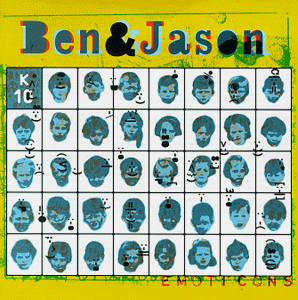 And if you think that title has aged badly, you should check out songs like “LOL (Means Laughing Out Loud)” and “I Can Haz Chronologically Challenged Referenz?”.*
And if you think that title has aged badly, you should check out songs like “LOL (Means Laughing Out Loud)” and “I Can Haz Chronologically Challenged Referenz?”.*
(* – This is, of course, not true. Instead, they did gentle and inoffensive pop songs like this.)
But it’s odd; I use emoticons myself, and kind of hate myself for it – I don’t really like them, you see, but I use them non-ironically nonetheless, somehow – but I can still remember when they seemed smart and clever uses of typography much in the same way that typing 07734 and turning the calculator upside down was so exciting as a kid. i-D Magazine, with its logo turned on the side so that it looked like a winking face (the cover of each issue featuring someone recreating the pose to varying degrees of success), was the zenith of hipster Britain media for years, and that logo was part of it. It genuinely seemed smart, at the time (It launched in 1980), like someone had found a new way to communicate an idea at odds with language itself.
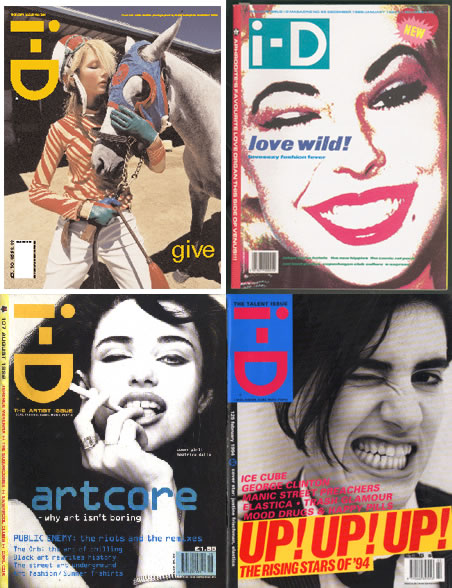 Nowadays, the idea seems… what? Boring? Twee? Both? Probably, and those are fair takes on the idea, and also fair fates for what seemed such a new and fresh idea almost 30 years ago. But just realizing that, thinking about how an idea I remember being stylish and interesting at one time has become so devalued and… beyond mainstream, makes me feel at once both old and ridiculously happy about how easily graphic design can seep into the real world and become something else.
Nowadays, the idea seems… what? Boring? Twee? Both? Probably, and those are fair takes on the idea, and also fair fates for what seemed such a new and fresh idea almost 30 years ago. But just realizing that, thinking about how an idea I remember being stylish and interesting at one time has become so devalued and… beyond mainstream, makes me feel at once both old and ridiculously happy about how easily graphic design can seep into the real world and become something else.
